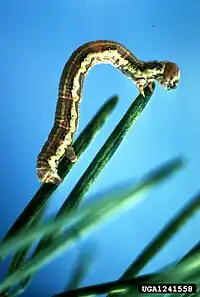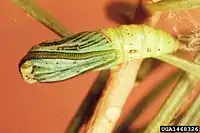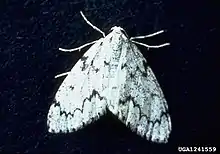Nepytia freemani
Nepytia freemani, the western false hemlock looper, is a moth of the family Geometridae. The species was first described by Eugene G. Munroe in 1963. It is found in North America from southern British Columbia and extreme southwestern Alberta south to Washington, Idaho, Montana and Utah.

Eggs

Caterpillar

Pupa
| Nepytia freemani | |
|---|---|
 | |
| Scientific classification | |
| Domain: | Eukaryota |
| Kingdom: | Animalia |
| Phylum: | Arthropoda |
| Class: | Insecta |
| Order: | Lepidoptera |
| Family: | Geometridae |
| Genus: | Nepytia |
| Species: | N. freemani |
| Binomial name | |
| Nepytia freemani Munroe, 1963 | |
The wingspan is about 21 mm. The moth flies from August to October depending on the location.
The larva feeds on various conifers.
External links
- Anweiler, G. G. & Schmidt, B. C. (April 7, 2004). "Species Details Nepytia freemani". University of Alberta Museums. E.H. Strickland Entomological Museum. Retrieved November 15, 2020.
This article is issued from Wikipedia. The text is licensed under Creative Commons - Attribution - Sharealike. Additional terms may apply for the media files.